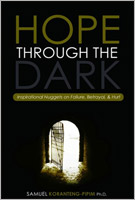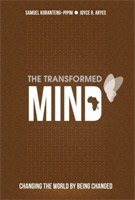Let’s Talk About Our Failures
[This short article was prompted by responses to one of my weekly thought-nuggets titled “The Value of Rags.” I pray that it will be a source of encouragement to those who are paralyzed by their past failures.—Samuel Koranteng-Pipim, PhD.]
Introduction
It’s easy to talk about our successes and accomplishments. But it takes real courage—and faith—to talk about our past failures.
I’m not saying we should dwell upon our failures. Rather, I’m suggesting that if the Lord has given us victory in a particular area of life, we owe it to others to share our experiences and the lessons we’ve learned.
People fail every day—and so do companies,institutions, and organizations. And yet, because of the loss, shame, pain,humiliation, and sometimes rejection, we seldom talk about our failures. Nay, we’re often prevented from talking about our failures.
In the aftermath of my own personal experience almost four years ago, I became painfully aware of the tremendous pressure that is often exerted—even by well-meaning Christians—to discourage or even forbid the penitent from sharing lessons from their failures. Left to the wonderful saints, repentant sinners cannot share their experiences or testimony either by voice or by pen. If the penitent are ever permitted to share at all,it has to be after a very long time—an indeterminate number of years as certified by the "un-fallen" saints or by those who pretend to have it all together.[1]
But is the notion—and attitude—that forbids us from talking about our failures biblical? Should we cower in fear or shame about sharing lessons learned from our painful past? In this brief article, I will offer three biblical reasons why those who’ve repented of—and turned away from—their sins have an obligation to talk about their past failures.
1. For the Instruction of Others
We must talk about our failures in much the same way as David did in his penitential lyrics of Psalm 51—namely to instruct others. Commenting on this Psalm, E. G. White wrote:
[Written] “to preserve to the latest generation the knowledge of his fall, the king of Israel recounted his sin, his repentance, and his hope of pardon through the mercy of God. Instead of endeavoring to conceal his guilt he desired that others might be instructed by the sad history of his fall” (Patriarchs and Prophets, p.725).
Observe that David’s testimony consisted of “his sin, his repentance, and his hope of pardon through the mercy of God.” And he did so in order that “others might be instructed by the sad history of his fall.”
Similarly, after his repentance, King Solomon wrote the books of Proverbs, Ecclesiastes, and Song of Songs to instruct others from his past failures. In these works Solomon “would humbly confess the error of his ways and lift his voice in warning lest others be lost irretrievably ”because of the evil influences of his previous deeds. Thus, the book Prophets and Kings aptly explains why we also must talk about our own past failures:
"The true penitent does not put his past sins from his remembrance. He does not, as soon as he has obtained peace, grow unconcerned in regard to the mistakes he has made. He thinks of those who have been led into evil by his course, and tries in every possible way to lead them back into the true path. The clearer the light that he has entered into, the stronger is his desire to set the feet of others in the right way. He does not gloss over his wayward course, making his wrong alight thing, but lifts the danger signal, that others may take warning” (Prophets and Kings, p. 78).
2. For the Encouragement of Others
On the night our Lord Jesus Christ was going to be arrested and ultimately killed on Calvary’s cross, He said to Peter:
“Simon, Simon! Indeed, Satan has asked for you, that he may sift you as wheat. But I have prayed for you, that your faith should not fail; and when you have returned to Me, strengthen your brethren.” (Luke 22:31, 32).
To “strengthen” (Greek sterizo) means to “make strong,” “encourage,” or “establish.” It is the responsibility of every converted child of God to strengthen others. Indeed, after his repentance and restoration by Christ a week later (John 21), the apostle Peter embarked upon a mission of “strengthening his brethren.” His sermon on the day of Pentecost as well as his two letters in the New Testament shows how seriously he took Christ’s words.
We also must talk about our past failures—by voice and by pen—in order to offer hope and encouragement to others who may be struggling with the same experiences we once had. Our testimony assures fellow believers—God’s eagles—that, though they may have failed, through God’s forgiving and enabling grace, God’s wounded eagles also can heal and soar again.
In the aftermath of my spiritual failure, and my subsequent interactions with many people, I discovered that there is a very large—but secret—world of failures out there—in society, as well as in the church. These individuals long to be free from the power of sin and their burden of failure. Frustrated with the elaborate culture of denial we have developed, they seek to know how to relate responsibly to failures. They want to experience victory over their past failures and know how to avoid future ones. But they’re afraid of the vindictive spirit often displayed by over-zealous saints.
To people who are thus discouraged, we must share our own experiences, showing how the Bible offers a transformative approach to human failure. We must offer them hope and encouragement by pointing them to Christ as the Source of our own victories. And we must share with them the things that enabled us to rise from our own failures.
“Help those who have erred, by telling them of your experiences. Show how, when you made grave mistakes, patience, kindness, and helpfulness on the part of your fellow workers gave you courage and hope.” (Ministry of Healing, p. 494).
Indeed, from the enthusiastic responses I have received around the world for my works on failure, I can testify that sharing our experiences of failure is a great source of encouragement to others. It’s for the same reason that I write and share my weekly thought-nuggets.[2]
3. For the Winning of Others
When we talk about our past failures, we’re not only instructing and encouraging others, but we’re also praising God, testifying about what He’s done for us. And incredible as it may seem, this personal testimony of God’s power in our lives is one of the most effective ways of winning others to Christ.
Thus, immediately after his penitential prayer for forgiveness and restoration in Psalm 51:1-12, David declares. "THEN will I teach transgressors thy ways; and sinners shall be converted unto thee" (verse 13).
In other words, sharing our experiences and the lessons from failure is a powerful form of witnessing—which action is a fruit of conversion. For every repentant sinner naturally has (or ought to have) a burden to lead souls to Christ:
“The very first impulse of the renewed heart is to bring others also to the Saviour” (TheGreat Controversy, p. 70).
Many times in the Gospel accounts, whenever Jesus healed people He sent them back to their hometowns or people to tell their stories to others. I can think of the Samaritan woman at the well, the paralyzed man on the mat, and the demoniac who said his name was “Legion.”Christ sent all these “wounded” individuals back to their people to share the stories of their healing by the Wounded Healer. Thus, Jesus told the demon possessed man of Gadara, “Go home to your own people and tell them how much the Lord has done for you, and how he has had mercy on you (Mark 5:19).
In the same way, talking about our failures is sharing the story of how the Lord has had mercy on us. And what the Lord has done for us, He can do for any other person.
Advice to Fellow-Patients
Let me conclude by reiterating what I stated at the beginning. When I say we must talk about our failures, I’m not saying we should dwell upon our failures. Rather, I’m suggesting that if the Lord has given us victory in a particular area of life, we owe it to others to share the lessons we’ve learned.
We don’t share our experiences of failure to make light or gloat over our sin, or to encourage others to sin. Rather, we share our experiences with the same attitude of C. S. Lewis when he wrote:
“Think of me as a fellow-patient in the same hospital who, having been admitted a little earlier,could give some advice." [3]
Armed with the authority from God’s Word, I also have made a commitment that for the remainder of my life I will give my “advice” to fellow-patients who are in the hospital of sin—the church. I will share my testimony or story to instruct, encourage, and win others to Christ.
Let’s quit pretending that we haven’t failed or don’t fail. Let’s talk about our failures—by voice or by pen. To refuse to do so, or to deny others the right to do so, is not only hypocritical but it’s also a denial of a major reason why the Bible was given us:
“Now all these things happened to them as examples, and they were written for our admonition, upon whom the ends of the ages have come. Therefore let him who thinks he stands take heed lest he fall” (1 Corinthians 10:11,12). E.G. White explains:
"The pen of inspiration, true to its task, tells us of the sins that overcame Noah, Lot, Moses, Abraham, David, and Solomon, and that even Elijah’s strong spirit sank under temptation during his fearful trial. Jonah’s disobedience and Israel’s idolatry are faithfully recorded. Peter’s denial of Christ, the sharp contention of Paul and Barnabas, the failings and infirmities of the prophets and apostles, are all laid bare by the Holy Ghost, who lifts the veil from the human heart. There before us lie the lives of the believers, with all their faults and follies, which are intended as a lesson to all the generations following them. If they had been without foible they would have been more than human, and our sinful natures would despair of ever reaching such a point of excellence. But seeing where they struggled and fell, where they took heart again and conquered through the grace of God, we are encouraged, and led to press over the obstacles that degenerate nature places in our way" (Testimonies, vol 4, p. 12.1).
In the light of the reasons given in this brief article, we should no longer hesitate in sharing lessons from our past failures. We should not be intimidated by the wonderful saints who feel they have little to learn from the experiences of others. We must ignore their cruel attacks and slander, trusting our case with our righteous Lord. And while not "wrestling with our pigs," whenever we ourselves are tempted to brag about our "new clothes," let’s pause and think about the “rags” (see the following two thought-nuggets):
WRESTLING WITH PIGS
“Never wrestle with a pig. You both get dirty, but the pig enjoys it” (An old adage). The Bible says: “Do not answer a fool according to his folly. Lest you also be like him" (Proverbs 26:4). At times the best response to falsehood, slander, and cruel attacks is to ignore them, trusting our case with God. We learn this from David, after Shimei cursed, accused, and threw stones and dirt at him (2 Samuel 16:5-14). Writes E.G. White: “False reports will circulate about us; but … let us leave to God the care of our reputation. Slander can be lived down by our manner of living; it is not lived down by words of indignation. Let our great anxiety be to act in the fear of God, and show by our conduct that these reports are false.” DON’T wrestle with your pigs!—Samuel Koranteng-Pipim
THE VALUE OF RAGS
“The youth can boast of new clothes, but never of as many rags as an adult” (West-African proverb). In stressing the value of rags, this proverb—as also Scripture—bids us to learn from the experiences of others (Romans 15:4). We must imitate their virtues and avoid their mistakes.Do you despise rags? C.S Lewis cautions: “Think of me as a fellow-patient in the same hospital who, having been admitted a little earlier, could give some advice.” I agree. To refuse lessons from other people’s experiences and to insist “I want to make my own mistakes” is to be very immature, arrogant, or idiotic—if not delusional. Be warned: He who derides others’ rags will surely lose his new clothes. (1 Corinthians 10:11, 12.)—Samuel Koranteng-Pipim [4]
—Samuel Koranteng-Pipim, PhD
[1] For a painful summary of my failure and experiences along the way, see “Highlights of Dr. Pipim’s Spiritual Failure & Journey” (Click here).
[2] My works on failure include my two sermon series “My Song in the Night” and “Take Heed,” my two books Six More Chances and Hope through the Dark, and my weekly thought-nuggets. These are available on our www.EAGLESonline.org website under the links: "Resources," "Store," and "Weekly Nuggets."
[3] C. S. Lewis, A Severe Mercy, Letter to Sheldon Vanauken (April 22, 1953), p. 134.
[4] For these and previous thought nuggets, go to: http://eaglesonline.org/weekly-nuggets/nuggets-archives/.









